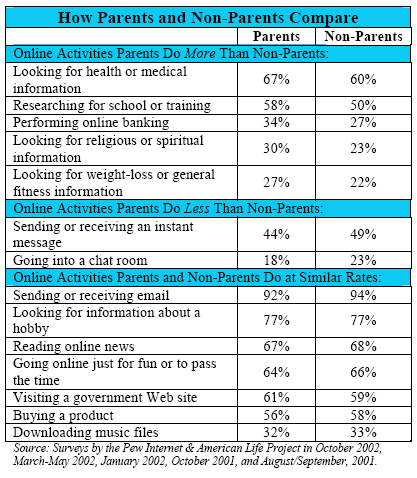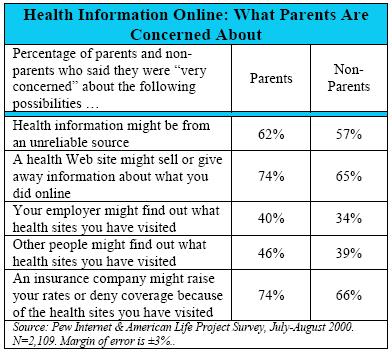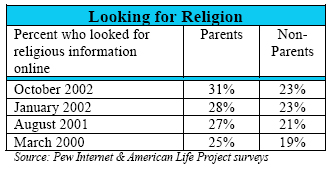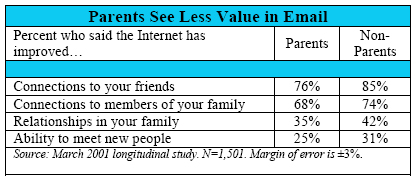Introduction
Wired parents and non-parents participate in many Internet activities in roughly the same proportions. These include using email, searching for financial information, accessing online news, participating in auctions and online, and doing general browsing. However, we have found in our analysis of the most common online activities that certain behaviors characterize online parents as a group and differentiate them from non-parents. These include looking for religious, weight loss/fitness, and health and medical information, but they also include banking online and doing research for a job or for school. Meanwhile, some activities appeal more to non-parents than parents, such as instant messaging and visiting chat rooms.

Dr. Mom on the Web
The search for health information online is one of the most important activities we have studied and it is something more women do online than men. Similarly, online parents are somewhat more likely than wired non-parents to seek health information. Not surprisingly, then, mothers are among the most fervent online health seekers. In our March-May survey 72% of online mothers said they had gone online to look for health or medical information. That compares to 57% of wired fathers who said they had done so.
Online mothers are often searching for information related to their children. Some 71% of online mom health seekers say they have gotten information online related to their role as a caregiver, according to our survey of health seekers in August 2001. Asked in that poll about their most recent e-health search, 34% of online mom health seekers said they were searching on behalf of their child. Another 27% were looking on behalf of their husbands and 16% were looking for a parent. These health seeker mothers were most often looking for information about what certain illness symptoms could mean or the kind of medication or treatment that certain illnesses require.
Parents are More Anxious about the Privacy of Online Health Information
Because parents must tend to their children’s health in addition to their own, they show a greater interest than non-parents in Web sites that provide health information. Our surveys show that a consistently larger percentage of parents visit health-related Web sites than non-parents. Among other things parents are more likely than non-parents to say it is important to them to be able to get e-health information at any hour. Parents are also more likely than non-parents to say the Internet has improved the way they get health information. In addition, our parents and teen survey in 2000 found that 19% of online parents say the Net had improved the way they care for their children’s health.

Wired parents are more rigorous than non-parents in their online health searches in some respects. First, parents tend to visit more sites and spend more time on a search. Second, they take a more deliberative approach to search engine results. They are more likely to read the explanations of a search engine result instead of just starting at the top and working down. And third, they are more likely to talk to their doctor about what they find online.
Yet, at the same time parents are less likely than non-parents to check for the source of the information on the Web sites they consult, check on the timeliness of the information that is posted, and check on the sponsor of the Web sites they visit.
One other difference is worth noting. Parents usually expressed more fear than non-parents about the privacy implications of their e-health searches. In August 2000, we asked survey respondents several questions related to online health. Parents were more likely than non-parents to state that they were “very concerned” that the health information they were finding was unreliable, that a health Web site might sell or give away information about what they had done online, or that their employers, insurance companies, or simply other people would discover what health sites they had visited.
The result is a jumble of contradictory – and somewhat unexplainable – behaviors: more health searching corresponds with less scrutiny of Web sites, but more follow up with other Web sites and medical professionals and more concern about who might be watching.
Parents and Privacy
These parental concerns about the privacy of online health information extend to the broader sphere on online privacy. As a rule, parents are even more sensitive than non-parents to privacy concerns. For instance, in a survey in the summer of 2000, we found that 84% of online parents think Internet companies should have to ask for permission to use any personal information that they collect, compared to 76% of non-parents.
Parents with Internet access whose children also go online are much more nervous about computer viruses, perhaps out of concern that their children will unwittingly infect the family machine. Sixty-two percent of these wired parents worry about downloading a virus to their computer, compared to 50% of non-parents.
Parents who are online are also less friendly and more wary of other people than non-parents online. Only 20% of parents have responded to an email from someone they didn’t know, compared to 30% of non-parents. Similarly, online parents are also less likely to make friends online: 20% of wired parents said they had made online friends, compared to 28% of non-parents who have Internet access.
Parents and Online Religious Information
The Internet has become an important resource for those seeking religious information and those who are members of a faith community. Survey data reveal that this is especially true of parents. According to our October 2002 survey, 31% of parents have gotten religious information online, compared to 23% of non-parents who have done that. Religion is more of a factor in parents’ lives than non-parents’. A greater proportion of parents belong to a church than non-parents.

Our August 2001 survey of those who get religious information online showed that parents are more likely than non-parents to make prayer requests via email, to download religious games, and to download religious music.
The parents who get religious material online have a relatively positive view of the overall impact of the Internet on people’s spiritual lives. Some 44% of the online religious seekers say they think the Internet has had a positive influence on how people practice their religion. These parents are also somewhat more likely than non-parents to say that online spiritual information encourages religious tolerance, though they also worry that it is too easy for fringe groups to use the Internet to hurt people. Parents are also more likely than non-parents to say that there is too much sacrilegious material online.
There are other indications in our data that show that parents are relatively more interested than non-parents in online spiritual material. For instance, a January 2001 survey showed that 24% of online parents had used the Internet to get in contact with or get information from a religious group or organization, which is somewhat higher than the 18% of online non-parents who said they had done this.
Parents, the Internet, and Major Life Moments
Our January 2002 survey asked respondents whether or not their use of the Internet had affected any major life decisions they had made. Parents were more likely than non-parents to say that the Internet had played a role in finding a new place to live, dealing with their own medical condition or the medical condition of a loved one, and starting a hobby. The figures are:
- 72% of the online parents who had started a new hobby in the past two years said the Internet played at least some modest role in their new interest. About 62% of online non-parents who had recently started hobbies said the Internet played a role.
- 65% of the online parents who said that they had dealt with a major illness in the past two years said the Internet had played a role in their coping with the illness. Some 53% of online non-parents who had been seriously ill said the Internet played a role.
- 63% of the online parents who had helped another person cope with a serious illness in the past two years said the Internet played a role in their helping another cope with the illness. Some 54% of the wired non-parents who helped another with a serious medical situation said the Internet played a role.
- 42% of the online parents who had found a new place to live in the past two years said the Internet played a role in their finding their housing. Some 31% of the wired non-parents who found housing recently said the Internet played a role.
It was also evident that online parents who had gotten significant training for their jobs in the past two years were almost twice as likely as wired non-parents to say that their use of the Internet played a crucial role in their getting that training.
Overall, parents with Internet access were much more likely than non-parents to report that the Internet played some role in a variety of important recent events in their lives.
How Parents Participate in Online Communities
In January 2001, we studied how the Internet is used for helping people connect to organizations and groups to which they belong – and also to see how they use the Internet to connect to new groups. We found that 32% of online parents have used the Internet to get information or contact a local community group, compared to 27% of non-parents. Not surprisingly, online parents are more likely than non-parents to have used the Web to get information about local schools, youth group activities like scouting, and community sports leagues.
Generally, parents seem more aware than non-parents about the places they can go online near where they live. Some 59% of parents say they know of a place in their community where Internet access is publicly available, while 47% of non-parents say they know of such public access.
The time strains on parents’ lives also showed up in this survey. Even though many online parents say they use the Internet to stay in touch with groups and organizations, a significant number of parents reported that they mostly lurked in those groups, rather than actively participated in them. Some 57% of wired parents said they only read the messages posted to the Web sites of their key organizations and 43% said they posted material on bulletin boards. That is different from wired non-parents: 40% said they had only read the bulletin board of a key organization in their life and 59% said they read and posted material to the bulletin boards of the Web sites of their key organizations.
Parents are Less Likely to Say Email Helps Them Maintain Relationships
In March 2001, we studied people’s attitudes, concerns, and behaviors related to email use. These data show that online parents were less likely than wired non-parents to report that their use of email helps them with their key relationships. In addition, non-parents were more likely to report that email has helped their ability to meet new people.
Despite the fact that online parents were less likely to say that email was very valuable to their relationships, they were more likely than non-parents to report that they had used email for serious purposes. The March 2001 survey asked respondents to name the one family member he or she emailed the most. Wired parents were more likely than non-parents to reply that they emailed this person about something they were upset or worried about, and were also more likely to email this person for advice. Non-parents were more likely to email their family members to tell them about their jobs or other activities.





